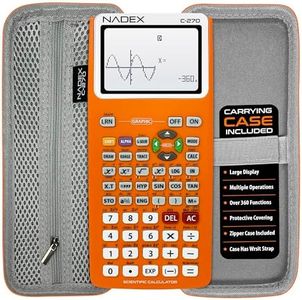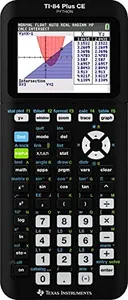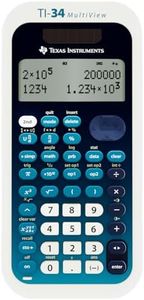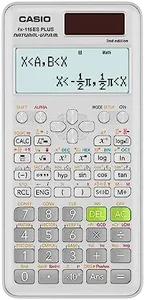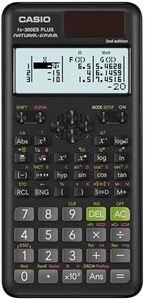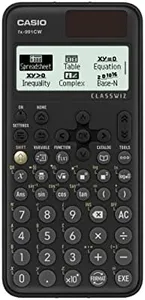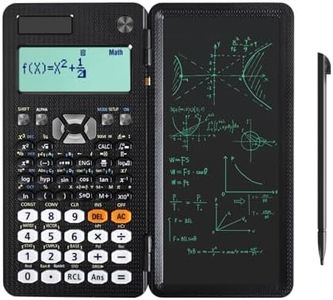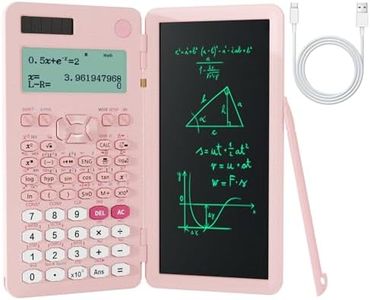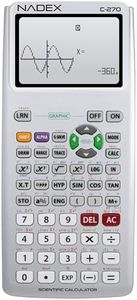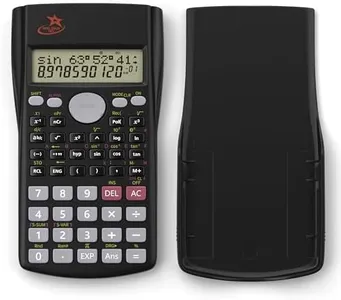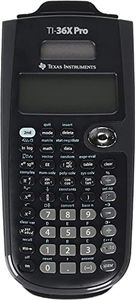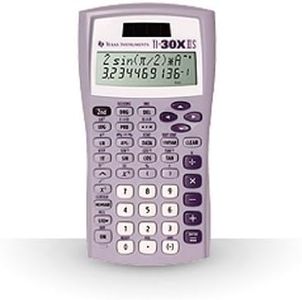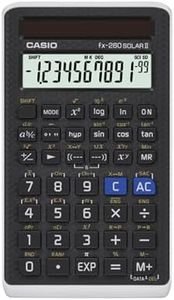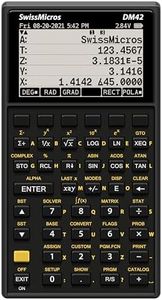10 Best Scientific Calculators 2025 in the United States
Our technology thoroughly searches through the online shopping world, reviewing hundreds of sites. We then process and analyze this information, updating in real-time to bring you the latest top-rated products. This way, you always get the best and most current options available.

Our Top Picks
Winner
Texas Instruments TI-84 Plus CE Color Graphing Calculator, Black
Most important from
27101 reviews
The Texas Instruments TI-84 Plus CE is a solid choice for students and professionals who need a reliable graphing calculator. Its high-resolution, full-color display makes it easy to visualize complex equations and graphs, which is a strong point for users in math and science fields. The option for horizontal and vertical split-screens is especially useful for comparing multiple graphs or data sets side by side. The calculator also boasts a rechargeable battery, which is convenient and environmentally friendly, reducing the need for constant battery replacements.
Additionally, the TI-84 Plus CE comes preloaded with various apps and features like MathPrint, which allows for more intuitive input and output of mathematical expressions. With seven different graph styles and fourteen interactive zoom options, users can customize their visualizations to better suit their needs.
The calculator's lightweight design, while beneficial for portability, may not feel as rugged as some users would prefer. Although it's durable enough for classroom use, more intensive users may want to handle it with care. The calculator's popularity means that you could end up with the Python version, which while beneficial for programming, may not be necessary for everyone.
Most important from
27101 reviews
Texas Instruments TI-34 MultiView Scientific Calculator
Most important from
8940 reviews
The Texas Instruments TI-34 MultiView Scientific Calculator is well-suited for students and professionals who need a reliable tool for scientific calculations. One of its standout features is the 4-line display, which allows users to scroll through and edit their inputs easily. This makes working on complex equations less cumbersome and enhances usability. The calculator also supports MATHPRINT mode, enabling users to input and view calculations in a format that resembles how they appear in textbooks, which can be especially helpful for learning purposes.
In terms of functionality, it includes capabilities like previous entry recall, which lets you review past calculations, and a table feature that aids in exploring function values. This can be beneficial for those studying math or science, as it provides a visual representation of data.
The TI-34 offers a good balance of features and ease of use, making it a strong contender for students, educators, and professionals working in scientific fields. However, those who frequently use their calculator in demanding environments may want to consider a more robust alternative.
Most important from
8940 reviews
Casio fx-115ESPLUS2 2nd Edition, Advanced Scientific Calculator
Most important from
6290 reviews
The Casio fx-115ESPLUS2 2nd Edition Advanced Scientific Calculator is a highly versatile tool designed for a wide range of scientific and engineering calculations. One of its most notable features is the 16-digit, 4-line LCD display, which provides a clear and accurate representation of expressions and results, mirroring how they appear in textbooks. This makes the calculator easy to use and understand, especially for students and professionals who need to work with complex equations and fractions.
Additionally, the over 280 functions cover a broad spectrum of calculations, including statistics, complex numbers, matrix and vector operations, and more. This makes the calculator suitable for various fields such as mathematics, engineering, and computer science. The multi-replay function is quite handy, enabling users to backtrack and edit previous calculations, which can save time and reduce errors. The solar power with battery backup ensures that the calculator remains functional even under low-light conditions, enhancing its reliability.
Durability is another strong point; the slide-on hard case protects the calculator from damage, making it a good choice for both classroom and fieldwork. However, while the calculator is packed with features, its extensive range of functions may be overwhelming for beginners or those who only need a basic calculator. Also, the reliance on a single LR44 battery for backup power means that users will need to keep spare batteries on hand to avoid interruptions. Despite these minor drawbacks, the Casio fx-115ESPLUS2 is well-built, highly functional, and user-friendly, making it a top choice for anyone in need of an advanced scientific calculator.
Most important from
6290 reviews
Buying Guide for the Best Scientific Calculators
Choosing the right scientific calculator can make a significant difference in your studies or professional work. Scientific calculators are essential tools for students, engineers, and professionals who need to perform complex mathematical calculations. When selecting a scientific calculator, it's important to consider your specific needs and the features that will best support your work. Here are some key specifications to consider and how to navigate them to find the best fit for you.FAQ
Most Popular Categories Right Now
